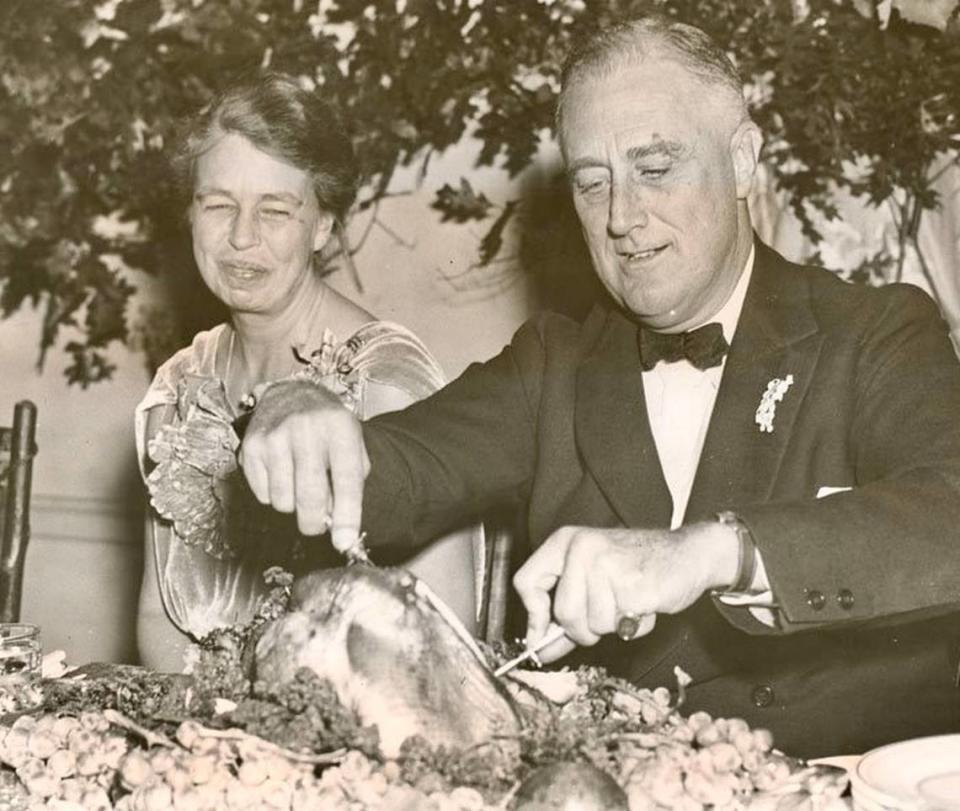Once, Texas had its own ‘States’ Rights Thanksgiving Day,’ to oppose FDR and Washington
This is a month when Texas used to celebrate Thanksgiving twice.
And not that long ago.
Until 1956 — say, when Jerry Jones was an Arkansas teenager — Texas leaders took a typically ornery position against celebrating the same Turkey Day as most of America.
So we had two.
In a stubborn stand against the federal government, Texas leaders continued to celebrate “States’ Rights Thanksgiving Day” on the last Thursday in November and refused to recognize the holiday as the fourth Thursday.
Back in 1939, President Franklin D. Roosevelt had moved the celebration to the fourth Thursday. That jump-started Christmas shopping.

But Texans refused to go along.
November has five Thursdays this year. That’s how it was in 1944, 1945, 1950, 1951 and 1956.
In those years, restaurants served turkey dinners twice.
Stores and federal offices closed on the first Thanksgiving. Public schools and state colleges closed and played football games on the second holiday.
In the newspapers, the two holidays were called “Texas Thanksgiving” and (President Franklin) “Roosevelt’s Thanksgiving.”
The Star-Telegram headlined: “Take Your Pick, 2 Days Slated for Thanksgiving.”
“Big business caused it,” an unnamed “woman shopper” complained in The Dallas Morning News.
Actually, politics caused it.

Back in 1939, Gov. W. Lee “Pappy” O’Daniel, a Fort Worth Democrat, had declared Texas would continue to celebrate the last Thursday as Thanksgiving in the name of America’s “Pilgrim Fathers.”
He refused to switch along with the rest of the country to the previous Thursday.
The Waco mayor was among officials who tagged the later state holiday “States’ Rights Thanksgiving.”
The new, earlier federal holiday was derided as a business scheme and Roosevelt’s “New Deal Thanksgiving.”
“While much of the world is at war,” O’Daniel said, “ … we, the citizens of Texas, have so much for which we should be thankful, we can very well observe two days of thanksgiving.”

Texas’ turkey breeders liked the extra sales.
Football also played a part. The University of Texas-Texas A&M game, had already been scheduled before Roosevelt changed the date.
State workers were choosing to take both holidays.
A ‘states’ rights’ Thanksgiving
Still, the Texas Legislature bickered mightily over changing it.
State Rep. Calvin Matthew from Cuero, “turkey capital of the world,” fought hard to protect the bird business: “You’re cutting in half the number of turkeys we can sell.”
With civil rights and school desegregation both prominent issues, state Rep. James Cotten of Weatherford called for Texas to defend celebrating its own separate Thanksgiving as “states’ rights”: “It is a Texas tradition and a Texas holiday.”
Never mind that Texas was solely American Indian country when the Pilgrims feasted in Massachusetts.
Or that when President Abraham Lincoln proclaimed the first official Thanksgiving in 1863 during the Civil War, Texas was fighting on the other side.
Even in 1956, State Rep. Scott McDonald, a Fort Worth attorney, was making the same states’ rights argument.
“Don’t you think if Texas holds the line, the other states will come along with us?” he asked.
Finally, in May 1957, Gov. Price Daniel — a graduate of Fort Worth’s Central High School, now Paschal — signed a new set of Texas holidays into law, moving the state Thanksgiving.
In conservative Montague County, the Saint Jo Tribune complained that he “went Yankee.”
A ‘Yankee institution’
That wasn’t even the first time Texas went rogue on Thanksgiving.
From 1879 to 1882, we had a governor who refused to declare the holiday.
Gov. Oran M. Roberts hated it.

Roberts, the first Tarrant County district judge and later the leader of Texas secession in the Civil War, considered the day an unwelcome federal mandate from Union Republicans in Washington.
He called it a “damned Yankee institution.”
Not until 1868 did Texas first celebrate Thanksgiving.
Even then, the Austin State Gazette mocked the day and asked why any Texan should ever celebrate “Reconstruction, the 14th amendment and [racial slur] voting.”
Roberts called Thanksgiving a “religious exercise.”
He said prayer wasn’t a government function.
Northern newspapers did not take him well.
The Cleveland Dealer called Roberts an “unrepentant rebel and traitor.”
The Philadelphia Inquirer wrote that he “seems determined to keep up his state’s record for barbarism.”
Even the Southern New Orleans Times called him “the most consummate demagogue … pandering to the worst prejudices.”
A 1907 Star-Telegram story calls him a Texas hero while adding casually that his slogan was “ ‘Civilization begins and ends with the plow’ — the motto of the Aryan race.”
See, Texas was stubborn about more than Thanksgiving.


